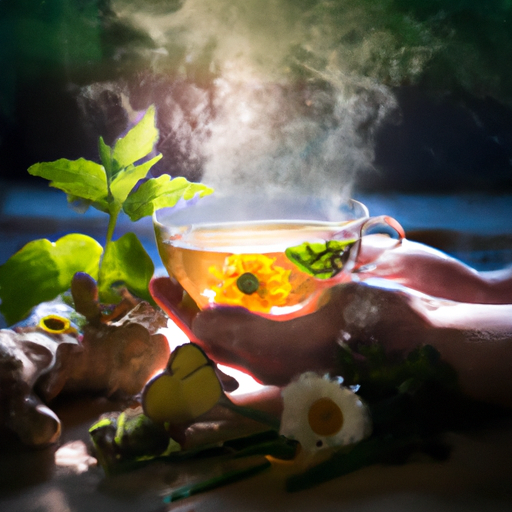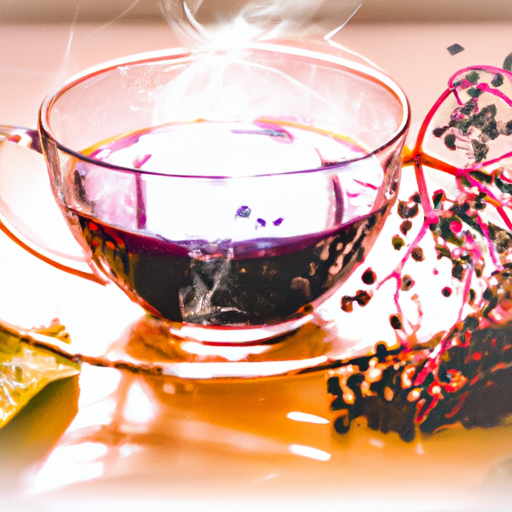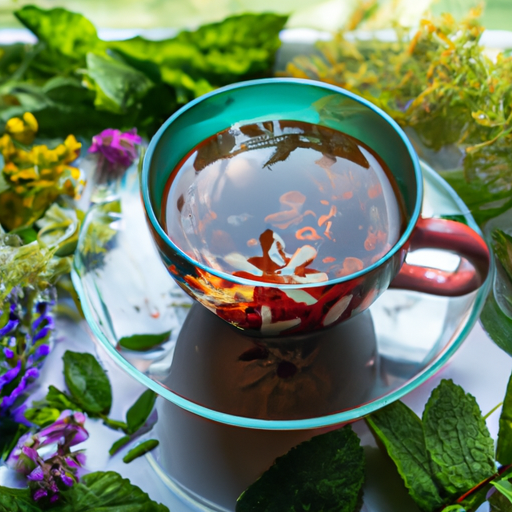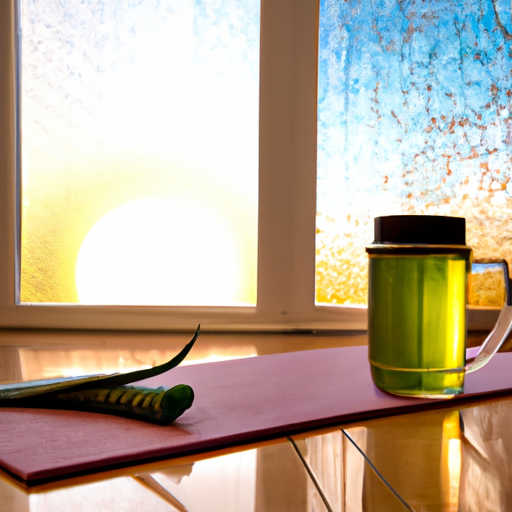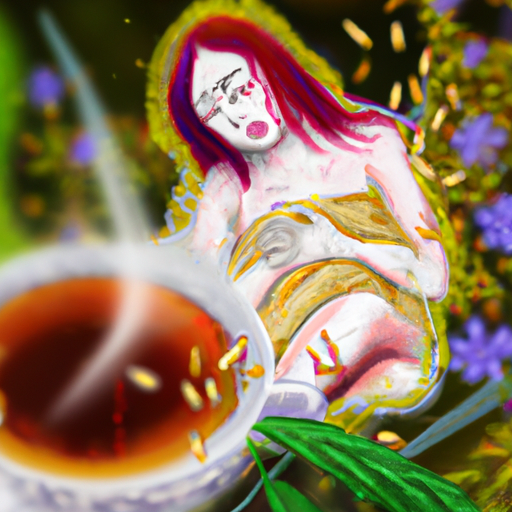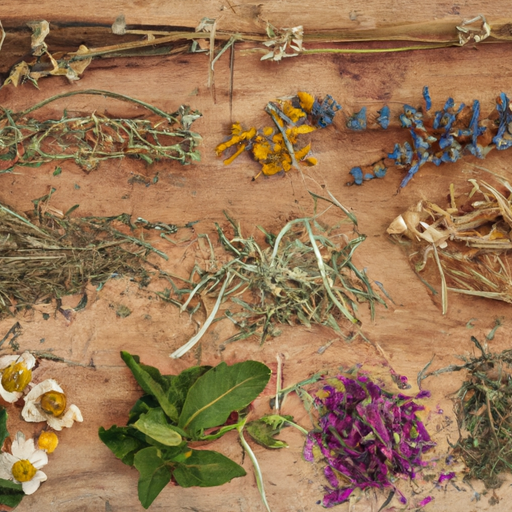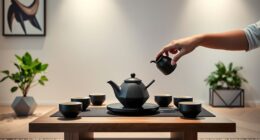Can herbal tea be beneficial for you when you are feeling unwell?
When we’re feeling under the weather, it’s natural to seek comfort and relief in a warm cup of tea. But is herbal tea just a soothing beverage, or does it actually have health benefits? You’ll be pleased to know that herbal tea can indeed be beneficial when you’re sick.
Packed with antioxidants, vitamins, and minerals, herbal teas can help boost your immune system, reduce inflammation, and alleviate symptoms such as coughing, congestion, and sore throat. But not all herbal teas are created equal, and choosing the right one for your specific symptoms is key.
In this article, we’ll explore the health benefits of herbal tea, how to select the right one for your needs, and the best ways to prepare it for maximum effectiveness. So, if you’re curious to learn more about how herbal tea can provide comfort and relief when you’re feeling under the weather, keep reading!
Key Takeaways
- Herbal tea is packed with antioxidants, vitamins, and minerals that are beneficial when sick.
- Choosing the right herbal tea for specific symptoms, such as chamomile and peppermint for respiratory symptoms and ginger for digestive issues, is important.
- Properly preparing herbal tea by steeping medicinal herbs optimizes its effectiveness.
- Herbal tea can be a soothing and beneficial way to stay hydrated when sick, but potential risks and drug interactions should be considered.
The Health Benefits of Herbal Tea
You’ll be delighted to discover how herbal tea can boost your health. Herbal tea has been used for centuries to support the immune system and promote respiratory health.
Many herbal teas are rich in antioxidants, which help to strengthen the immune system and protect the body against harmful free radicals. Additionally, certain herbs commonly found in herbal teas, such as chamomile and peppermint, have been shown to have anti-inflammatory and antimicrobial properties. These properties can help soothe respiratory symptoms and fight off infections.
When choosing the right herbal tea for your symptoms, it’s important to consider the specific benefits of each herb. For example, if you’re experiencing congestion, a tea with eucalyptus or ginger may be beneficial.
Transitioning into the next section, let’s explore the different types of herbal teas that can help alleviate specific symptoms.
Choosing the Right Herbal Tea for Your Symptoms
When feeling under the weather, it’s important to select the appropriate herbal infusion based on your specific symptoms.
For digestive issues, herbal teas like chamomile, peppermint, and ginger can provide relief. Chamomile has anti-inflammatory properties that can soothe an upset stomach, while peppermint and ginger can help ease indigestion and bloating.
If you’re experiencing respiratory symptoms such as a cough or congestion, herbal teas like eucalyptus, thyme, and licorice root can be beneficial. Eucalyptus has expectorant properties that can help clear the airways, while thyme and licorice root have anti-inflammatory properties that can soothe a sore throat.
These herbal teas can be a natural and comforting way to alleviate your symptoms.
Moving forward, let’s explore how to prepare herbal tea for maximum effectiveness without compromising its healing properties.
How to Prepare Herbal Tea for Maximum Effectiveness
To optimize the effectiveness of your herbal infusion, it’s essential to skillfully prepare the brew by steeping the medicinal herbs in hot water for the recommended duration. The right combination of herbs can provide relief from cold and flu symptoms and boost your immune system. Here are a few herbal tea recipes that can help:
| Herbal Tea Recipe | Benefits |
|---|---|
| Echinacea and Elderberry | Boosts immune system |
| Ginger and Lemon | Relieves congestion and sore throat |
| Peppermint and Chamomile | Soothes upset stomach and promotes sleep |
By following these recipes and steeping the herbs correctly, you can maximize the medicinal benefits of your herbal tea. However, it’s important to remember that herbal tea is not a substitute for medical treatment. It can complement your recovery, but if your symptoms worsen, consult a healthcare professional. Now let’s discuss the importance of staying hydrated when sick.
The Importance of Staying Hydrated When Sick
Staying hydrated is crucial for maintaining your body’s healing process and ensuring a speedy recovery. This is especially important during flu season when our immune systems are more vulnerable.
Proper hydration supports our immune system and helps our body fight off infections. To stay hydrated when sick, it is recommended to drink plenty of fluids, including water, herbal tea, and clear broths. These fluids can help replace the fluids lost through fever, sweating, and coughing. Additionally, hot herbal tea can soothe a sore throat and provide relief from congestion.
It is important to avoid sugary drinks and caffeinated beverages as they can dehydrate the body. As we move into the next section about potential side effects and precautions, it is essential to understand the importance of maintaining hydration levels while being mindful of any possible risks.
Potential Side Effects and Precautions
Beware of possible pitfalls and precautions when partaking in hydration practices while under the weather. While herbal tea can be a soothing and beneficial option for hydration when sick, it’s important to be aware of potential risks and drug interactions. Some herbal teas may have side effects or interact with certain medications, so it’s crucial to consult with a healthcare professional before incorporating them into your routine.
Additionally, certain herbs used in herbal teas may not be suitable for everyone, especially pregnant women, children, or individuals with specific medical conditions. It’s also important to remember that herbal teas shouldn’t replace medical treatment for serious illnesses. With these precautions in mind, herbal tea can be a helpful addition to your recovery plan.
Transitioning to the subsequent section about other natural remedies to consider alongside herbal tea, it’s important to explore a holistic approach to wellness when sick.
Other Natural Remedies to Consider Alongside Herbal Tea
Consider incorporating other natural remedies, such as warm lemon water or aromatic steam inhalation, to complement your soothing hydration routine. These remedies can provide additional relief and support during illness. Essential oils, like eucalyptus or peppermint, can be added to a diffuser or a warm bath to help relieve congestion and promote relaxation. Honey and lemon are another powerful combination that can soothe a sore throat and provide immune-boosting benefits. Adding a spoonful of honey and a squeeze of lemon to warm water can create a comforting drink that can help alleviate symptoms. Remember to choose raw, organic honey for its antimicrobial properties. With these natural remedies, you can enhance your healing process and find comfort in the midst of illness. Transitioning into the subsequent section about the comforting benefits of herbal tea when sick, these additional remedies can further support your overall well-being.
Conclusion: The Comforting Benefits of Herbal Tea When Sick
Indulge in the ultimate soothing elixir that’ll wrap you in a warm, comforting hug and transport you to a realm of healing and relaxation.
When you’re sick, herbal tea can provide a multitude of benefits that go beyond just warming your body. It can help alleviate symptoms, boost your immune system, and promote overall well-being.
Alongside herbal tea, there’re other alternative remedies worth considering. These include honey and lemon, which can provide relief for sore throats, and ginger, which can help with nausea and digestion.
To fully experience the comforting benefits of herbal tea, try these delicious and easy-to-make herbal tea recipes.
Chamomile tea can soothe inflammation and promote better sleep, while peppermint tea can relieve congestion and soothe an upset stomach. Lastly, echinacea tea can strengthen your immune system and help fight off infections.
So, the next time you’re feeling under the weather, reach for a cup of herbal tea and let its healing powers work their magic.
Frequently Asked Questions
Can herbal tea cure my illness completely?
Herbal tea can provide some relief when sick, but it is not a cure-all. Natural remedies like herbal tea have their benefits, but medical treatments should also be considered for complete recovery.
How long should I drink herbal tea when I am sick?
When I’m sick, I enjoy sipping on herbal tea. It’s comforting and helps me feel better. To make it at home, I gather ingredients like ginger or chamomile, each with their own benefits.
Is it safe to drink herbal tea if I’m already taking medication?
It is important to consider potential drug interactions and side effects when combining herbal tea with medication. Consult with a healthcare professional to ensure it is safe for you to drink herbal tea while taking medication.
Can I drink herbal tea if I have pre-existing health conditions?
Herbal tea can be a suitable alternative for medication if you have pre-existing health conditions. However, it’s important to consult with a healthcare professional to ensure it won’t interact negatively with your condition or current medications.
Are there any age restrictions for consuming herbal tea when sick?
When sick, herbal tea can benefit children by soothing sore throats and promoting hydration. Pregnant women should consult their doctor before consuming herbal tea, as some herbs may have adverse effects.
Conclusion
In conclusion, herbal tea is the absolute bomb when you’re feeling under the weather! It’s like a magical elixir that can soothe your symptoms and boost your immune system.
With its myriad of health benefits and natural healing properties, herbal tea is a must-have in your sick day arsenal. So grab a mug, steep some delicious herbal goodness, and let the healing powers of tea work their magic. Trust me, you’ll be feeling better in no time!

